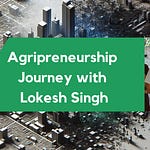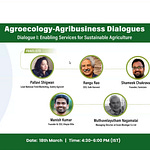Dear Friends,
Welcome to a brand new podcast season of Agribusiness Matters.
Talking about survival is ironic. The moment you sincerely ask the question “Why does something survive?”, what you will end up with is least what you expected - an inventory of reasons why it won’t survive.
What does it take to survive as an agritech entrepreneur in an age of funding winter?
Unlike other [X}tech domains in which a sufficient understanding of technology can supersede your insufficient understanding of the [X} domain you are working in, [Agri]-Tech, unfortunately, doesn’t offer you those privileges.
It is a fiendishly tough game for founders and entrepreneurs to crack for an uncanny reason: It is perhaps the last domain with a LIVE system that you have no choice but to deal with.
In most other industries, over a span of say fifty-sixty years, the industry players have a better sense of who the customers are and what they want. However, in the case of agriculture, much to my surprise, even if you talk to veterans who’ve spent decades in the industry, it is pretty much evident that there is much left to understand farmers and the risk-taking lives they lead.
What grade of steel must the nerves of an entrepreneur be forged on to survive and thrive on these challenges?
Much like my previous podcast episode on the art of a Happy Agritech Exit (which transitioned from members-only to a public video on Youtube a few weeks ago), in this podcast episode as well, I cover the inner game of entrepreneurs (with a lot of hesitant “You know” fillers) required to survive under uncertainty.
How does an agritech founder navigate the choices at their disposal to pick their ecosystem among a market of crowded niches? What does it take to build inward focus to prioritize what is important and what is not?
Since this was largely an informal conversation among friends who happened to be agritech founders, you will hear some Hindi phrases tossed around whenever someone talked about anything extremely close to their heart.
In this podcast, I chatted with 1) Sajith Abraham, Co-Founder of Meratractor.com -a phygital farm mechanisation platform 2) Kshitij Thakur, Co-Founder of Agrograde - providing grading and sorting solutions for fruits and vegetables 3) Dean Dutta, Founder, Digicides - farmer communication platform to bridge farmers and businesses and towards the end, Vivek VS, an ex-agritech entrepreneur also joined us with his reflections at the end of the panel.
In this conversation, we cover
What are some of the contrarian decisions (including “no-gos”) that founders took at the start of their journey?
What were the darkest moments like when they felt they couldn’t take it any longer? What were their mistakes?
How is the farm mechanisation ecosystem, farmer communication ecosystem, institutionalized quality and grading ecosystem evolving in an Indian context and what does it take to disrupt entrenched status-quoist behaviours?
Is Funding Winter a problem or an opportunity? What are the pros and cons of being bootstrapped (in the case of Dean and his startup) vis-a-vis funded ( as in the case of Sajith and his startup)?
How to manage investor expectations and relationships during a funding winter?
What does it take to change the “How” in a ‘boring’ traditional sector like agriculture?
I hope you enjoy this heartfelt, candid dialogue on survival as much as I did.
So, what do you think?
How happy are you with today’s edition? I would love to get your candid feedback. Your feedback will be anonymous. Two questions. 1 Minute. Thanks.🙏
💗 If you like “Agribusiness Matters”, please click on Like at the bottom and share it with your friend.


















